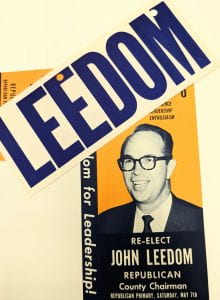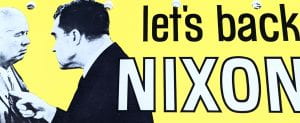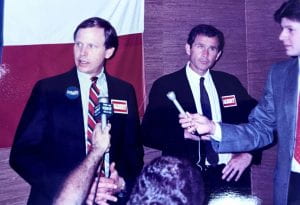This blog post was composed by graduate assistant Bailey Edling, a master’s student in the History Department.
When researching Texas history, it is no surprise that there is a myriad of seemingly unconnected incidents and historical agents woven together by men and women unfamiliar to the general populace. In movies like Forrest Gump, Tom Hanks is the unassuming common thread, pulling us through the colorful tapestry of American history. In real life, it is more likely to be someone in a position of power, someone, for instance, like the late John Leedom.
John Leedom was a husband and father, a Dallasite, a business owner, a City Council member, a county chairman for the Republican Party, an elector, and eventually, a Texas State Senator. Poage Library recently received a collection of Leedom’s papers. I found within old law school binders scraps and clippings glued together somewhat haphazardly. These described the life of a man who had witnessed, rubbed shoulders with, and partaken in American history. The John Leedom papers illuminate the life of a Texas politician and illustrate Texas’ vital place in American politics.

In 1961, Leedom ran for and won a Dallas County chairman position in the Republican Party. This position thrust him into Texas and US politics and highlights a common theme in Leedom’s papers—his work in campaigns and elections. One such election was a November 1963 special election for two spots in the Texas House of Representatives. Signaling the significance of this election, flyers for the Republican candidates proclaim, “Join the Fight Against the Kennedys Now!”[2] In other years, in other cities, this election may not have meant so much, but both Republicans and Democrats thought it might provide insight into how Dallas, and possibly Texas, might vote in the upcoming presidential elections.

Underscoring the importance of the special election and Texas politics, President Kennedy stopped in Dallas on his campaign trail. “John Leedom said Friday the spirit of Dallas Republicans toward President Kennedy’s visit…will be one of ‘100 percent hospitality.’”[3] Leedom hoped to make the President’s visit notable only for its magnanimity. Unfortunately, this would not come to pass, as Kennedy was assassinated just hours into his Dallas visit.

John Leedom didn’t just campaign for local elections; he also became an influential voice in national elections. “I want to express my personal appreciation for your efforts on behalf of my candidacy for President of the United States,” Richard Nixon wrote to Leedom.[4] In 1968, Leedom worked alongside Richard Nixon to secure Texas’ vote. Nixon won his 1968 election and invited Leedom to attend the inauguration. In just a few short years, Nixon would become the first president to visit the People’s Republic of China, ended the United States’ involvement in the Vietnam War, and in August 1974, resigned amidst the Watergate Scandal.
In 1976, Leedom again campaigned for a Republican candidate, this one running against the incumbent Republican nominee, Gerald Ford. In July 1976, Ronald Reagan wrote Leedom, “Clark Reed…asked me recently what kind of campaign I think we ought to run…and why I feel I am better equipped to run such a campaign than Mr. Ford…I thought you might be interested in my reply….”[6] Leedom was an early supporter of Ronald Reagan, and though Reagan did not win the Republican nomination in 1976, he did win it in 1980, an election Leedom again supported him in.

Letters from Betty Ford and Nancy Reagan to Leedom’s wife, Betty, give insight into women’s critical roles in campaigns and elections. Nancy Reagan wrote Betty in 1976, “Dear Mrs. Leedom: I’m very happy to accept your kind invitation to come to Dallas…I’ve heard many great things about your Club and want to congratulate you. The Republican Women of this country are the lifeblood of the GOP….”[7] Handwritten flyers for Republican Women’s events, pictures from parties and gatherings Leedom hosted, and even a blue ribbon she won for her needlework in the State Fair were tucked between newspaper clippings and tickets to Republican National Conventions. The Leedom papers do not just illustrate how one man supported several future presidents; it also illuminates the integral support of women like Betty Leedom.

In the 1980s, John Leedom corresponded and met with men who would further intertwine Texas and US Politics. Letters from George H.W. Bush peek out between newspaper articles detailing his 1988 campaign for presidency. An entire scrapbook held photos from campaign parties and events for Bush and a local Republican candidate, Beau Boulter. Inside, a picture labeled “George Junior” captures the future president George W. Bush on the campaign trail, casually displaying Leedom’s connections to US presidents from the 37th to the 43rd.
In 1980, Leedom further solidified his political involvement when he ran for and won a spot in the Texas State Senate. Leedom served in the Senate for 16 years, where he worked on committees such as Education, Finance, and Economic Development.[9]
In 1988, Leedom wrote the Texas “Rainy Day Fund” bill, which saves excess money from taxes on oil and gas to be used in emergencies. This bill has perpetuated his legacy in Texas and US political history even after his death. The fund has been used to help with Hurricane Harvey relief, the construction and maintenance of Texas highways, and was most recently used in 2021 to help the state’s power grid recover from a devastating winter storm.[10]
The John Leedom papers, stapled, taped, and dust-covered, tell the story of a man who did not just stand by and watch history unfold; he actively participated in Texas and US politics for over three decades. If Forrest Gump ends with a feather floating in the wind, it is perhaps most befitting that Leedom’s story would end here, just a few months before the midterm elections. One can imagine an “I Voted” sticker floating across Baylor’s campus, where his collection now resides.
[1] “RE-ELECT JOHN LEEDOM,” n.d., John Leedom papers, Accession #109, Box #1, Folder #8, The Baylor Collections of Political Materials, W. R. Poage Legislative Library, Baylor University.
[2] “JOIN THE FIGHT AGAINST THE KENNEDYS NOW!,” n.d., John Leedom papers, Accession #109, Box #1, Folder #1, The Baylor Collections of Political Materials, W. R. Poage Legislative Library, Baylor University.
[3] “Hospitality of GOP Seen For Kennedy,” Dallas Times Herald (Dallas, TX, November 8, 1963).
[4] Richard M. Nixon to John Leedom, “Richard Nixon, Washington D.C.,” November 1, 1968, John Leedom papers, Accession #109, Box #2, Folder #7, The Baylor Collections of Political Materials, W. R. Poage Legislative Library, Baylor University.
[5] “Let’s Back NIXON,” n.d., John Leedom papers, Accession #109, Box #2, Folder #7, The Baylor Collections of Political Materials, W. R. Poage Legislative Library, Baylor University.
[6] Ronald Reagan to John Leedom, “Citizens for Reagan,” July 20, 1976, John Leedom papers, Accession #109, Box #1, Folder #3, The Baylor Collections of Political Materials, W. R. Poage Legislative Library, Baylor University.
[7] Nancy Reagan to Betty Leedom, “Mrs. Ronald Reagan,” April 12, 1976, John Leedom papers, Accession #109, Box #3, Folder #5, The Baylor Collections of Political Materials, W. R. Poage Legislative Library, Baylor University.
[8] George Junior, Photograph, 1988, John Leedom papers, Accession #109, Box #1, Folder #7, The Baylor Collections of Political Materials, W. R. Poage Legislative Library, Baylor University.
[9] “Texas Legislators: Past & Present,” Government, Legislative Reference Library, https://lrl.texas.gov/mobile/memberDisplay.cfm?memberID=59.
[10] Clare Proctor, “Texas Has Billions in Its Rainy Day Fund. But Legislators Say They Won’t Use It until January.,” The Texas Tribune (Austin, TX, May 11, 2020), https://www.texastribune.org/2020/05/11/texas-economy-rainy-day/; Erin Douglas and Mitchell Ferman, “Texas Legislature Approves Bills to Require Power Plants to ‘Weatherize,’ among Other Measures to Overhaul Electric Grid,” The Texas Tribune (Austin, TX, May 26, 2021), https://www.texastribune.org/2021/05/26/texas-power-grid-reform-legislature/.